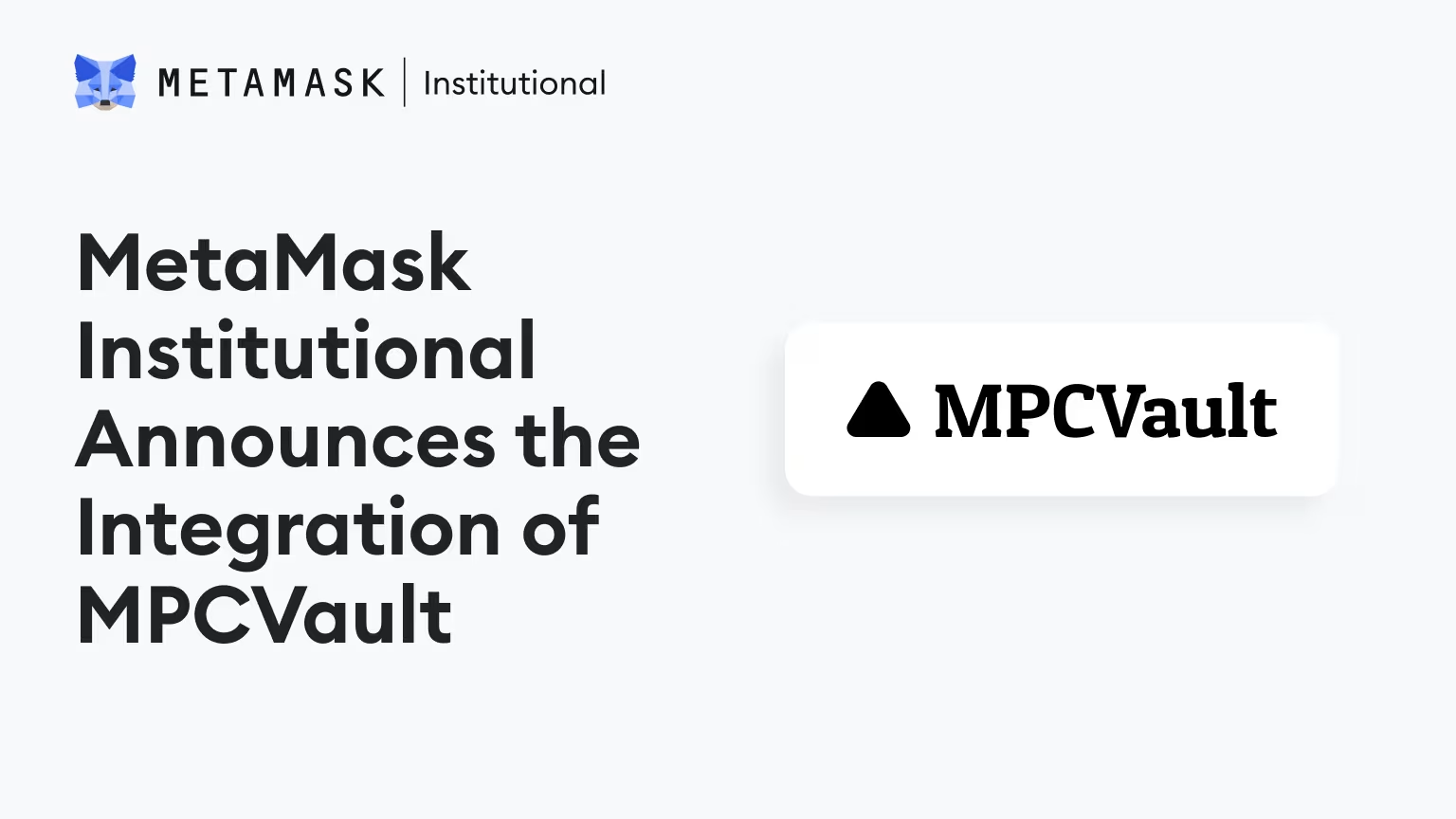Simran has been writing for as long as she can remember, whether it was poetry and prose for school magazines to breaking down complex business news and events later in life as a business journalist. Currently, she is immersing herself in the world of web3 content, writing about everything from the Ethereum upgrades such as the Merge and Shapella; to how the institutions are interacting with this technological revolution; and most recently, trying to demystify layer 2s. Outside of work, Simran loves to get lost in a book, or take long walks around Vancouver, a city she absolutely loves and calls home. Before Consensys, Simran has worked for Bloomberg and The Economist Group. She holds a Masters in Business and Economic Reporting from Columbia Journalism School, and Diplomas in Liberal Studies and English Journalism.
Read all articlesMetaMask Institutional Integrates With MPCVault
MetaMask Institutional partners with self-custody wallet MPCVault to provide organizations of any size with access to DeFi that fulfills institution-required...

MetaMask Institutional (MMI) is thrilled to announce that it has partnered with MPCVault, providing organizations of any size with the tools necessary to gain secure, efficient, and compliant access to the world of Decentralized Finance (DeFi).As we launch our Early Adopter Program, we are excited to see the integration of MMI and MPCVault bring benefits such as comprehensive blockchain support across 12 chains, institutional grade policy settings, programmatic access and bank-like transaction history to crypto hedge funds, venture capitalists and builders venturing into DeFi.Let us get more insight into this partnership from two key figures, Rizvi Haider, Product Manager at MetaMask Institutional, and Jason Li, Co-Founder and CEO at MPCVault, who discuss this exciting development.Rizvi Haider: Jason, can you tell us why you created MPCVault, and how it stands out in the market?
Jason Li: MPCVault was created to provide multi-signature crypto wallets as a service, much like an enterprise bank for traditional businesses. The major selling point is our non-custodial approach that lets users, rather than MPCVault or any other centralized party, retain complete control over their wallet keys. This is a feature increasingly sought after as centralized wallets lose credibility. The user experience of MPCVault is best-in-class and we have robust APIs our customers can build with.
RH: What specific features or functionalities does MPCVault bring to MMI users?
JL: MPCVault is designed to provide a versatile set of key features to help clients better manage their assets. It offers a completely self-driven platform that does not need us for operational management. Users can securely create vaults, wallets, multi-sig policies, new users, API keys, and more through user authentication without interacting with MPCVault.MPCVault supports all token types without whitelisting. If a user is minting the latest hot NFT or their own brand-new token, they can see and interact with the token in MPCVault immediately.Perhaps most attractive is our bank-like transaction history. This feature tracks all your asset movements and breaks out each transaction into its parts in a consolidated view. In a DEX swap, for example, users can view both legs of the swap and the gas payment individually. Users can also add transaction notes pre- and post-transaction to provide context around the transaction across their team. All of this is, of course, exportable to excel and queryable using our API.We also provide comprehensive blockchain support, with support for 12 blockchains currently. And we are always looking to support more to align with our customer’s needs. We can support new blockchains more easily than our competitors due to early design decisions. Lastly, but probably most importantly, we have designed the product to be intuitive and reliable. Users reliably receive signing requests and our system processes requests quickly and efficiently.
RH: What security measures does MPCVault have in place?
JL: MPCVault’s architecture eliminates any single point of vulnerability and empowers users to secure their assets in self-custody. any consumer and custodial wallets require just one private, encrypted key to authorize transactions. However, business decisions often involve approvals from multiple parties for internal control, which is exactly what MPCVault allows.MPCVault is the only wallet solution that utilizes all three major cloud platforms – AWS, Azure, and Google Cloud. Our multi-cloud approach further reduces the potential for compromises that could occur with a single-cloud provider. The runtime environments are secured with Trusted Execution Environments. MPCVault utilizes AMD's SEV and Intel's SGX to create an orthogonal risk profile and enhance protection for users’ assets by employing encrypted memory, ephemeral cryptography, and remote attestation. To reduce the trust base, all critical components and communications within MPCVault are end-to-end secured using public key pinning.Aside from safeguarding keys, an enterprise-facing wallet should also protect client assets in a manner that web2 antivirus software works to protect users from attacks. To that end, MPCVault’s wallet solution comes with a security layer that scans for phishing URLs, detects suspicious behaviour, checks for interacted addresses, and performs semantic analysis and transaction simulation to help users understand what transactions they are signing.Finally, MPCVault is SOC 2 Type 2 certified as a vendor for enterprise software. We also undergo regular penetration testing to proactively identify potential risks and implement mitigation measures.RH: Now let’s look at how the integration between MMI and MPCVault will bring added advantages and facilitate scalability for users.
Aligning with MPCVault will offer our users access to an MPC provider, which provides an extensive suite of features at a competitive price point. Moreover, MPCVault makes it very simple for users to get started with their free tier.
MPCVault is the first custodian to implement our updated integration standard that now supports broadcasting facilitated by MMI. This fundamental upgrade lets users choose and broadcast through any RPC provider, enabling them to transact on EVM-compatible chains.In one of the latest releases, MMI introduced support for Snaps. With Snaps, the functionalities of the MMI extension can be further enhanced with transaction insight Snaps and notification Snaps. With MPCVault, we take the first step to enable our customers to transact on non-EVM chains. We have initiated the work with MPCVault to build a Cosmos Snap which is a much-requested non-EVM chain support that we are receiving.
Interested in learning more about MMI and MPCVault’s integration? Click here to schedule a demo!
MetaMask Institutional is an institution-compliant version of the world’s leading web3 wallet, MetaMask. Organizations trust MMI to manage their web3 access and engagement with institution-required security and operational efficiency. MMI enhances web3 portfolio management with institutional controls, digital asset monitoring, and transaction reporting, all on one dashboard. With MMI, institutions can integrate with their chosen custody or self-custody provider to help manage key storage, facilitate multi-signature transaction approvals, and optimize trade flows.
MPCVault is a multi-signature, MPC wallet utilized by organizations ranging from Web3 treasury managers, centralized exchanges, fiat-to-crypto bridges, hedge funds, venture capital funds, and more. Presently, over 80 companies use MPCVault as their team wallet to manage assets across different chains, interact with dapps, and handle payrolls, payments, and accounting. MPCVault has over $500M in assets secured by the platform and has facilitated over $3B in transactions in 2023. The founding team has expertise in cryptography and computer security. MPCVault also holds a patent for achieving hardened derivation in multi-party computation.



